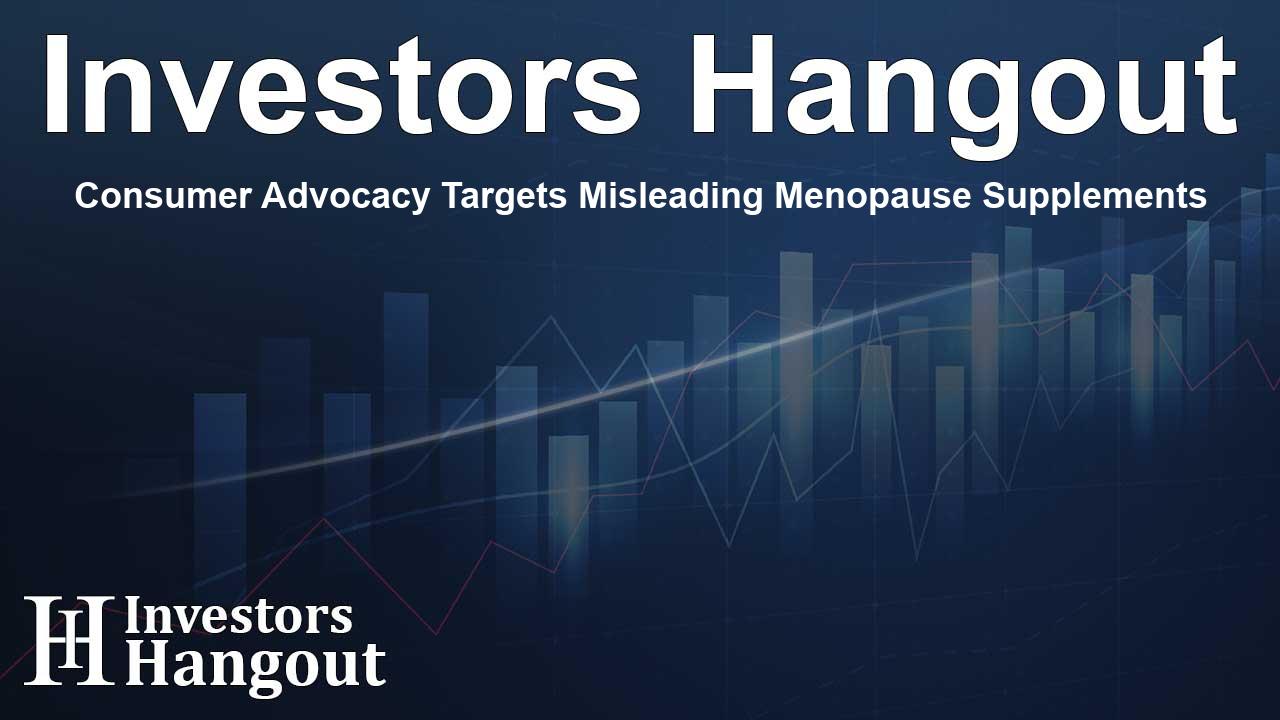Consumer Advocacy Targets Misleading Menopause Supplements

Investigation into Menopause Supplement Misconduct
An extensive investigation into the menopause supplement industry has uncovered alarming instances of deceptive advertising practices. The advocacy organization truthinadvertising.org (TINA.org) has documented nearly 2,000 instances of misleading health claims associated with popular menopause supplements. This has prompted TINA.org to file complaints with both the Federal Trade Commission (FTC) and the Food and Drug Administration (FDA) against brands such as Pharmavite's Equelle and Alliance Pharmaceuticals' Amberen.
Understanding the Market Demand
Every day, around 6,000 women in the U.S. transition into menopause, fueling a significant demand for products intended to provide relief from associated symptoms like hot flashes, anxiety, and sleep disturbances. Projections estimate that the global menopause supplement market will exceed $22 billion by 2028, indicating a lucrative opportunity for companies in this sector.
The Problem with Menopause Supplements
Despite the rampant marketing, research indicates that many menopause supplements fail to deliver effective relief for the symptoms associated with this natural life stage. TINA.org highlights that numerous brands are making health claims in their advertising without adequate scientific backing, contravening FTC regulations. In some instances, these claims are so exaggerated that they effectively fall under drug claims, which raises additional concerns with FDA compliance.
Responsibility of Supplement Brands
TINA.org's Executive Director, Bonnie Patten, emphasizes the ethical implications of such marketing strategies: "These supplement brands are exploiting women who are suffering from distressing menopause symptoms by promoting expensive products that lack credible evidence of their efficacy. This predatory marketing must be addressed immediately."
Claims of Efficacy Under Scrutiny
Equelle has been marketed as a guarantee for menopause relief, making claims of clinical support for alleviating severe symptoms such as hot flashes and night sweats. Similarly, Amberen advertises itself as addressing an array of menopause-related issues, from sleep disturbances to shifts in mood and libido. However, TINA.org's findings indicate that neither of these brands has provided the necessary scientific evidence to back up such claims as mandated by law.
Potential Consequences for Noncompliance
The violations identified against Amberen could result in significant financial repercussions, potentially amounting to millions in civil penalties, especially since the company is already under scrutiny for previous misleading claims. The findings of TINA.org highlight the urgent need for regulatory bodies to enforce compliance in the health supplement industry.
Widespread Concern in the Industry
In response to its findings, TINA.org has not only filed regulatory complaints against Equelle and Amberen but also reached out to over 100 other menopause supplement manufacturers. These communications aim to alert these companies to the ongoing trend of deceptive marketing within the industry, strongly urging reviews of their promotional claims to ensure they align with legal requirements.
Consumer Awareness Initiatives
The organization has taken proactive measures by issuing a consumer alert regarding the misleading health claims associated with menopause supplements. This alert provides crucial information on what consumers should be vigilant about when assessing the credibility of health claims made in this rapidly growing sector.
How to Stay Informed
For those interested in learning more about the ongoing issues surrounding deceptive marketing in the menopause supplement arena, TINA.org has made comprehensive resources available. These resources highlight critical insights into the marketing practices that may mislead consumers looking for genuine relief from menopause symptoms.
Frequently Asked Questions
What is TINA.org's role in the menopause supplement investigation?
TINA.org is a consumer advocacy organization that aims to protect consumers from deceptive advertising, and it has filed complaints against menopause supplement brands for misleading marketing.
How many menopause supplements are being scrutinized?
TINA.org has reviewed thousands of promotions and identified nearly 2,000 misleading claims related to menopause supplements.
What are the common claims made by these supplements?
Many supplements claim to provide relief from hot flashes, anxiety, night sweats, and other menopause-related symptoms, but evidence supporting these claims is often lacking.
What penalties could brands face for false claims?
Brands making false claims may face hefty civil penalties from regulatory entities like the FTC and FDA, with potential financial repercussions running into millions.
How can consumers protect themselves?
Consumers should stay informed about the claims made by menopause supplements and consult healthcare professionals about potential treatments and their efficacy.
About Investors Hangout
Investors Hangout is a leading online stock forum for financial discussion and learning, offering a wide range of free tools and resources. It draws in traders of all levels, who exchange market knowledge, investigate trading tactics, and keep an eye on industry developments in real time. Featuring financial articles, stock message boards, quotes, charts, company profiles, and live news updates. Through cooperative learning and a wealth of informational resources, it helps users from novices creating their first portfolios to experts honing their techniques. Join Investors Hangout today: https://investorshangout.com/
Disclaimer: The content of this article is solely for general informational purposes only; it does not represent legal, financial, or investment advice. Investors Hangout does not offer financial advice; the author is not a licensed financial advisor. Consult a qualified advisor before making any financial or investment decisions based on this article. The author's interpretation of publicly available data shapes the opinions presented here; as a result, they should not be taken as advice to purchase, sell, or hold any securities mentioned or any other investments. The author does not guarantee the accuracy, completeness, or timeliness of any material, providing it "as is." Information and market conditions may change; past performance is not indicative of future outcomes. If any of the material offered here is inaccurate, please contact us for corrections.